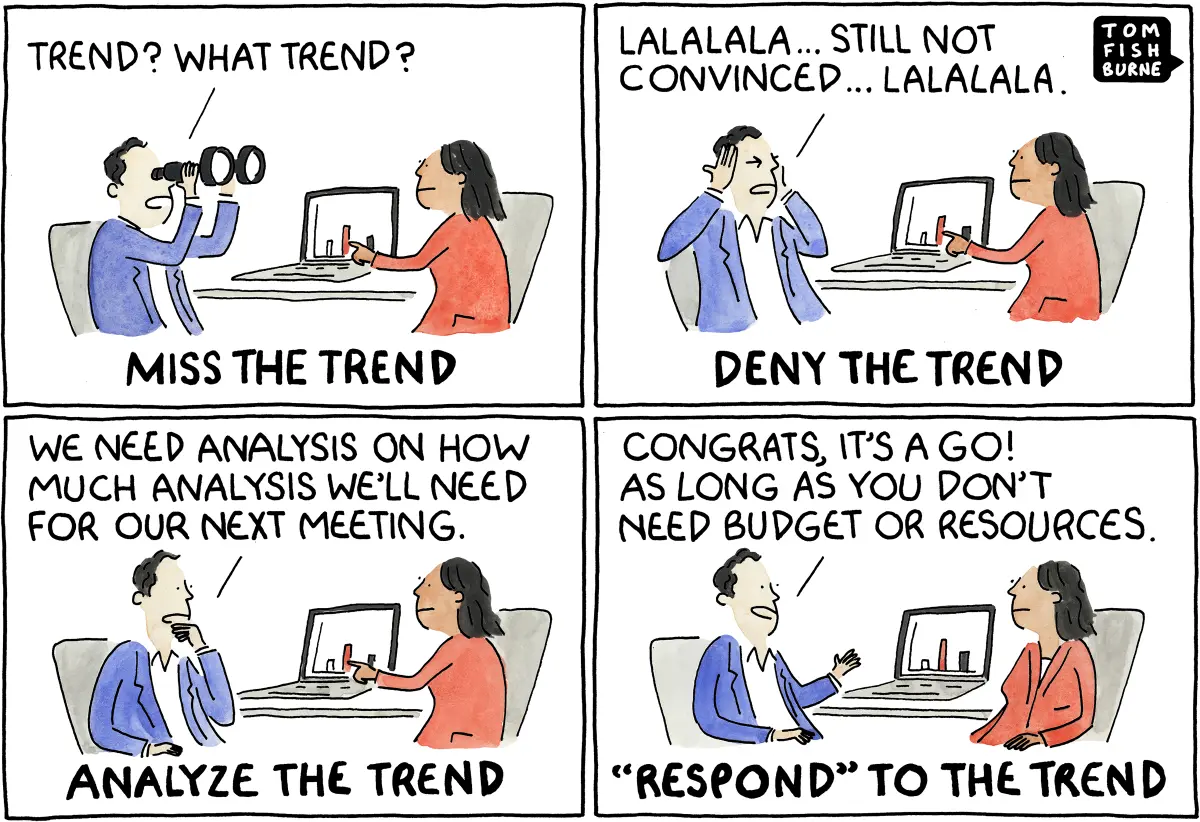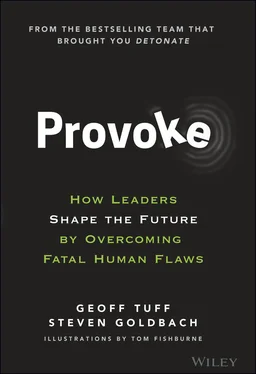This pattern of behavior, which we've seen over and over again, prompted us to write Provoke . There are many trends we see in our line of work as strategists and consultants that are labeled as “uncertain.” A chasm separates if something will happen (what we think of as true uncertainty) from the uncertainty of when something will happen. This difference matters immensely. It dictates how you act in the face of the trend, and the failure to recognize this nuance in meaning is what leads most leaders to miss, deny, analyze, and respond meekly, following the pattern of our hand-in-his-waistband executive.

THE SOLUTION IS TO PROVOKE
Our executive, and the organization he represented, had blinders on – blinders that we all wear, to one extent or another – that narrowed its organizational peripheral vision and ability to evaluate the importance of the changes found on the periphery. These blinders – constructed of basic human biases that we all share – mean that the playing fields we observe are narrower than the real world. Our maps, as the saying goes, are not the territory.
Combined with organizational dysfunction – overanalysis; meetings with no end or, seemingly, any point; and so on – they lead to systematic inaction. That inaction means that rather than setting our own course, we let others make decisions for us or limit the range of our choices – just as brick-and-mortar stores did. Our momentum (really, our inertia) will drag us into a predictable series of choices that will lead to failure in the face of a new reality represented by the glimmer of those trends.
These biases are the subject of the chapters of Part I, Predictable Patterns. We also offer solutions you can start implementing now to overcome some of these issues.
In Part II, Principles of Provocation, we introduce five moves you can make depending on whether you face an “if” or a “when.” These are: envision the future, position yourself for success, drive change, adapt to changing circumstances, and activate your ecosystem. These tools will help you avoid those biases that prevent meaningful action, expand your peripheral vision to better assess your playing field, and prompt you to actually DO SOMETHING!
Some people are more successful at circumventing the problems caused by our biases. In Part III, Profiles of Provocateurs, we present three stories – inspirational ones, we think – of executives who have provoked their organizations to create a better future.
But first let's return to our friend with his hand down his pants and perhaps a bit of egg on his face today now that we're all cord cutters. Steve and his colleague were unable that day to convince him to take an interest in that small group. It remained, at least on that afternoon in his fancy office, too small a segment to matter. We don't know if or how much his company debated the idea later, but it's fair to characterize their market responses as meek relative to Netflix's. They were too late to catch up (although we're sure they thought of themselves as fast followers). It took them a while to get around to taking action, despite already having many of the requisite capabilities within their organization.
In the meantime, Netflix's stock price (adjusted for splits) has gone from roughly $4 at the beginning of 2008 at the time of the meeting to over $500 at the time of our writing this, an increase of more than 100-fold. At the end of Q3 in 2020, Netflix was approaching 200 million paying members (the last published statistic at the time of writing) and had a market capitalization in excess of $200 billion.
At the same time, the executive team at our client (who introduced us to the person in the story) followed a different strategy. Based on their early insight into this trend, they realized they were now effectively a wind-down firm . A wind-down firm is a cousin of the pop-up firm , which itself is launched to capture a narrow window of market demand – think of a Halloween store that pops up on October 1 and disappears on November 1. The difference is that the wind-down firm had as its original intent the goal to “last forever,” but is now riding the wave to obsolescence whether its executives know it or not.
Because of their early insight, our client realized that, without meaningful reinvention, their business model was dead, despite still being highly profitable. So they sold the business. The choice to sell was ultimately a good one for them. They were able to cash out in time, whereas companies with similar assets, capabilities, and business models continue to struggle with the growing segment of customers that prefers to have more control over their content experience through companies like Netflix.
While choosing to become a wind-down firm is a completely legitimate strategy choice, there is a lot of potential value creation in adapting and successfully pursuing new market trends. That's what we want to explore with Provoke : as leaders, we all need to have better pattern recognition capability to enable us to spot trends and move to where the world is going to be. Even if you ultimately decide not to pursue the trend, the moves we describe will ensure you are making that decision on your terms and not those dictated by market forces.
But before we get into how to spot those trends, we need to identify – and correct for – the fatal human flaws that get in the way of us seeing these trends in the first place. In Chapter 2, we'll address how to go from “ifs” to “whens” – that is, how to stop treating trends that are already unfolding as mere possibilities.
1 1. Christopher McFadden, “The Fascinating History of Netflix,” Interesting Engineering, July 4, 2020, https://interestingengineering.com/the-fascinating-history-of-netflix.
2 2. Arnold Zwicky, “Just between Dr. Language and I,” Language Log, August 7, 2005, http://itre.cis.upenn.edu/~myl/languagelog/archives/002386.html.
3 3. For more on the “winner take all” economy, see Roger Martin, When More Is Not Better (Boston: Harvard Business Review Press, 2020).
CHAPTER 2 On the Importance of “If” versus “When”
Daddy, I used the “Dude Wipes” and my tushy feels minty.
—Grayson Goldbach, age 5, during the great toilet paper shortage of March 2020
Before the pandemic, you probably took toilet paper for granted. And reasonably so. It's one of many things that we use every day without much conscious thought. It's something we just assume will be there for us – until it's not. That's when people go into a mini-panic. Remember the episode from the television show, Seinfeld , where the antagonist du jour told Elaine, “I don't have a square to spare”? The pandemic gave us a window into how humans would behave if a TP shortage were an ongoing challenge.
We believe human behavior is the most basic “subatomic element” of business. The pandemic gave us many opportunities to observe human behavior under periods of severe disruption. And it turns out that, when faced with such massive disruption, toilet paper is one of the things that helps people feel secure when on hand in large quantities. We also learned that people really have no idea how much toilet paper they actually need … so much so that in early 2020, a plethora of toilet paper calculator sites suddenly started to pop up on Internet ad feeds – something neither of us had imagined needing before.
The combination of fear and poor estimation led to some pretty interesting hoarding behavior and a resultant run on toilet paper. Rational or not, it was most certainly the case that when you went to buy TP it was difficult to find.
Читать дальше













